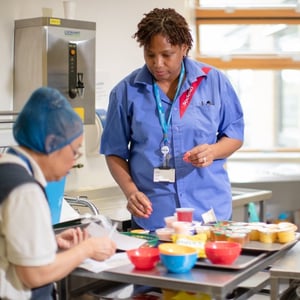Elevating patient nutrition with guidance from dietitians
The nourishment of your local community can transform not only people’s physical health but also their mental health. Good nutrition is essential to help prevent diet related illness. Patients have different nutritional requirements based on age, gender, activity level and condition of health. And meeting nutritional requirements plays a very important role in their recovery. Read the article to know more.
The independent review of NHS hospital food investigated the challenge catering teams face to ensure people recover and feel better with the aid of the food they eat during their stay.
Sodexo Dietitians play a key role in ensuring that the food patients eat and enjoy meets their nutritional needs to improve their health. The recommendations within the hospital food review will play a key role to ensure that nutrition is embedded within the staff and patient dining experience.
Malnutrition and understanding nutritional requirements
Malnutrition is where an individual is not getting enough nutrients from their diet to meet their body’s demands. Every year, 3 million people on average are affected by malnutrition or under nutrition in the UK1.
It affects around 10% of older people, however as many as 1 in 3 elderly patients admitted to hospital are found to be malnourished or at risk of malnourishment2.
Although many of us may think that malnutrition only occurs in people who are underweight, it is important to note that it also occurs in people who are overweight or obese. This is because they may be eating a diet high in energy, protein and fat, but it may still be low in vital vitamins and minerals leading to malnutrition risk.
Learn more now: Improving inpatients’ clinical outcomes with guidance from dietitians
Why is nutrition in hospitals so important?
Malnutrition is estimated to cost the NHS more than £13 billion per year.
Upon admittance to hospital, many malnourished patients continue to lose weight during their stay. It is estimated that between 30-40% of people admitted to hospitals are at risk of malnutrition, with consequences that are detrimental for both patients and healthcare providers3.
Malnourished patients stay longer in hospital, and they are 3 times more likely to develop complications during surgery and have a higher mortality rate.
Hospitalisation is an ideal opportunity to target improving nutritional outcomes.
We can improve patient experience and contribute to improved outcomes by making small changes to the way we work and delivering these consistently every day.
Tackling malnutrition through delivering best patient dining
 Patient dining incorporates a range of nourishing meals, snacks and beverages to patients in hospital.
Patient dining incorporates a range of nourishing meals, snacks and beverages to patients in hospital.
In order to provide a consistent delivery of high-quality food and drink services to patients, all component parts must work together. This means trained, competent staff, equipment fit for purpose, and tailored menus offering the right food and beverages to achieve the best result.
Our expectation is that every patient has a positive patient experience.
At Sodexo, we understand the importance of optimising patients’ nutritional intakes, providing nutritional education and training to our staff and providing good quality nutrition to all patients including nutritionally vulnerable patients.
Meeting NHSE food standards in healthcare
We are delighted that the independent review of NHS hospital food puts nutrition at the heart of the staff and patient dining experience.
For many years, we have worked in partnership with NHS Trusts across the UK and used scientific and dietetic insights to progress our food agenda and recognise the critical value of food to wellbeing and clinical recovery.
Sodexo strives to improve people’s quality of life. We want to make a positive difference to the lives of the people we serve. We utilise our knowledge of quality food service provision and implement the NHS recommendations by:
- Partnering with NHS Trusts to improve the dining experience
- Partaking in the NHS Food Standards and Strategy group to increase the standards and safety of food across the industry
- Creating development opportunities for our colleagues providing the food service
- Investing in digital solutions to improve the patient experience.
The impact of dietitians in patients’ diets
Research published4 recommends to have a food committee comprising a hospital manager, catering staff, nursing staff and food service dietitians who meet on a regular basis to set goals and monitor progress at hospitals. It is widely recognised by research that good nutrition can reduce the risk of medical complications and the length of patient hospital stays5.
A standard menu is designed to provide a balanced diet offering a wide choice. It consists of dishes suitable for most patients including those with diabetes and heart problems, higher energy, easy to chew or vegetarian choice. Some patients, however, may need a more specialised diet.
A special diet generally requires the reduction or complete exclusion of certain foods or textures of food, or an increase in the number of certain foods, ingredients, or textures in the daily diet.
When people are admitted to hospital they may already be on a special diet and unless advised otherwise usually continue whilst in hospital.
Sodexo menus are designed by healthcare dietitians and are clinically led and evidence-based with supporting nutritional analysis and allergen data.
Dietitians play a vital role in ensuring patient health
Having specialist dietetic skills within your team adds resilience and SMEs to your operations. It creates a robust workforce that is equipped with right and complete skillsets to provide best possible care for your patients.

Sodexo’s team of dietitians provide in-house dietetic input and expertise to support all aspects of our food service delivery, advise on nutrition and dietetic issues which includes continuously reviewing and drawing on current research, publications and good practice.
Eliminating guesswork by having an in-house nutrition and dietetics expertise, that is dedicated to the food and drink people receive in hospital, will help you tackle any hospital nutrition problems as the research6 shows that the key to reducing malnutrition is early intervention. Dietitians are medical specialists with specific nutrition training who concentrate on evaluating and identifying patients at risk for malnutrition, preventing malnutrition, and improving nutritional status. Dietitian evaluation and intervention is useful in enhancing dietary intake and quality for patients who are at risk of malnutrition.
Our dietitians have in-depth expert knowledge and can assist with menu reviews, ensuring that the nutritional content of the menus meets national standards and encompasses all reasonable dietary requirements and a wide range of diets including:
- Therapeutic diets
○ Gluten free
○ Renal
○ No added salt
○ Low potassium
○ Low phosphate
- Texture modified and dysphagia diets
○ Liquidised / moderately thick
○ Purée
○ Minced and moist
○ Soft and bite-sized
○ Easy to chew or regular
- Cultural and religious diets
○ Halal
○ Kosher
○ Hindu
○ African Caribbean
- Lifestyle and personal diets
○ Vegetarians
○ Vegans
- Healthier eating and diabetes
- High and low fibre diets
- Allergen free diets
- Serving additional dietary snacks & oral nutritional supplements
An effective strategy for preventing malnutrition is to involve the dietitian early, within 24 hours of hospital admission7, and Sodexo makes delivering the most humane and preventative measures possible even within these challenging and tight timelines for you with its in-house dietitian support through comprehensive and nutritionally complete tailored menus.
Using food to improve patient wellbeing
According to new YouGov research for Sodexo Health & Care, 93% of inpatients believe that they are more likely to get better quicker and leave hospital sooner if they have had a positive hospital experience.
Adequate hospital nutrition is at the heart of a timely recovery for patients. It will help patients get back on their feet promptly and reassuringly. Therefore, creating a nutritional culture through consistently achieving nutrition goals and considering nutrition practice an important part in the way to recovery of patients is an essential element of their care pathway.
Recent research suggests that this culture is developed by engaging and educating all team members around the challenge of malnutrition, the processes, tools and resources needed for quality care, as well as the demonstration that this quality care is not only the ‘right thing to do’, but also an effective treatment for improved health and quality of life of patients.8
How we do things differently at Sodexo
CARES is our own bespoke customer engagement initiative that brings structure and process to the art of being good at what we do. It stands for Consideration, Accountability, Respect, Enthusiasm, Service. We ensure all parties get the service they wish for by maximising the effect of every interaction between our staff and the people our clients serve.
 All our patient menus meet the British Dietetic Association DIGEST Guidelines and provide a wide choice for patients. During the three months (Sept - Nov '22) Sodexo scored 88% satisfaction (using CQC satisfaction methodology) for food choice when surveyed patients about their stay.
All our patient menus meet the British Dietetic Association DIGEST Guidelines and provide a wide choice for patients. During the three months (Sept - Nov '22) Sodexo scored 88% satisfaction (using CQC satisfaction methodology) for food choice when surveyed patients about their stay.
Our nutritionally analysed menus provide the patients we look after with the most suitable food they need for recovery while maintaining the highest possible standards and producing safe food in a safe environment for all patients and employees.
In addition to the EHO and our efforts in achieving the highest possible rating, we have Sodexo Safegard in place. They are part of Service Operations Health & Safety, Environment and Quality department within Sodexo, comprised of professionally qualified, competent, health & safety, food safety, environmental and quality specialists. Ensuring our policies and standards are designed to the highest standards of health, safety and welfare of our clients’ employees as well as our own employees, they develop, monitor and continuously improve our Health Safety and Environmental systems, policies and tools. We aim to achieve a green standard status at each and every hospital and venue alike we operate within.
Improved outcomes through delivering great nutritional care
Sodexo is helping providers create more positive patient experiences through good nutrition. Recognising the need for putting hospital food at the centre of a good hospital stay, and fighting malnutrition which delays recovery and discharge, we support patients to get better quicker and leave hospital sooner.
Our team of dietitians are happy to support patients to become nutritionally well by providing comprehensive and nutritionally complete tailored menus to aid recovery quicker.
Having this dietetics support and expertise within your team does not only help you build a robust and future-proofed workforce, but also adds resilience to your staff and credibility to what we do, which is needed for delivering empowered patient experiences, which in turn improves patient flow in hospitals.
Patient Nutrition | Sodexo Health & Care
1. Introduction to Malnutrition (2018) BAPEN. Available at: https://www.bapen.org.uk/malnutrition-undernutrition/introduction-to-malnutrition?showall=&start=4 (Accessed: December 19, 2022).
2. Ibid.
3. Beavan S., Baker R., Sadler H. & Collinson A. (2019) Improving the nutritional intake of hospital patients: how far have we come? A re-audit. J Hum Nutr Diet. 32, 372–384 https://doi.org/10.1111/jhn.12607
4. Mitchell, H. Nutrition audit at a community hospital. Journal of Human Nutrition and Dietetics (1999), 12, 425–432.
5. McWhirter, J.P. & Pennington, C.R. (1994). Incidence and recognition of malnutrition in hospital. Br. Med. J., 945–8.
6. Holmes RA. Role of dietitians in reducing malnutrition in hospital. CMAJ. 2019 Feb 4;191(5):E139. doi: 10.1503/cmaj.71130. PMID: 30718340; PMCID: PMC6351246.
7. Eckert KF, Cahill LE. Malnutrition in Canadian hospitals. CMAJ 2018;190:E1207
8. Keller HH, Vesnaver E, Davidson B, Allard J, Laporte M, Bernier P, Payette H, Jeejeebhoy K, Duerksen D, Gramlich L. Providing quality nutrition care in acute care hospitals: perspectives of nutrition care personnel. J Hum Nutr Diet. 2014 Apr;27(2):192-202. doi: 10.1111/jhn.12170. Epub 2013 Oct 23. PMID: 24147893.